- Home
- entertainment
- news
- Meet the Al-Fayeds, the family on "The Crown" who bought Harrods and The Ritz and were close with Princess Diana
Meet the Al-Fayeds, the family on "The Crown" who bought Harrods and The Ritz and were close with Princess Diana
Keyaira Boone

- The Al-Fayed family encounters the house of Winsdor in "The Crown's" fifth season.
- The family amassed significant wealth before hobnobbing with royals.
Season five of "The Crown" introduces the Al-Fayed family, formerly the Fayed family, to the royal saga.
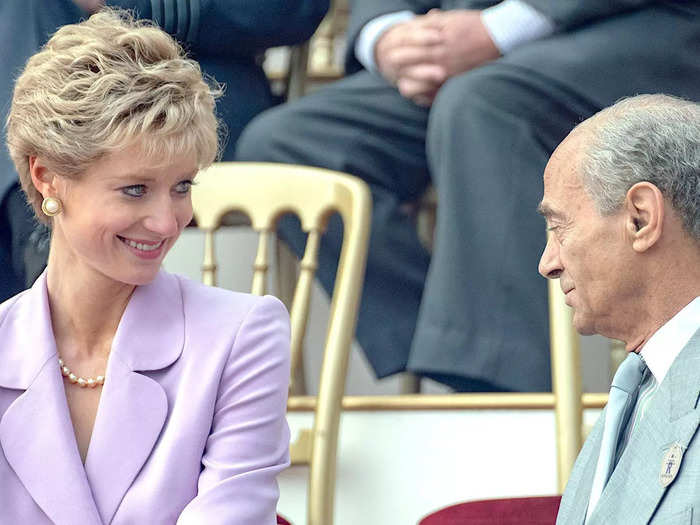
In episode three of "The Crown," the Al-Fayed family is questioned about their background when they put in a bid to purchase the Ritz in Paris.
Their brazen social climbing and association with the royal family placed the clan in the spotlight in season five.
The wealthy family is well-known throughout Britain for purchasing Harrods and for their close personal ties to Princess Diana.
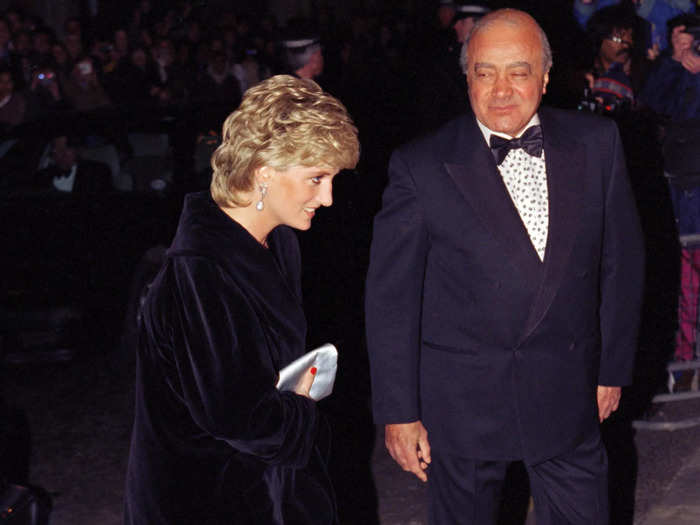
Despite their wealth and fame, the family had trouble fully integrating into the highest rung of British society, the royal family. A 1997 article from the Washington Post said Mohamed Al-Fayed was "snubbed by the titled blue bloods."
"The Crown" depicts them being kept at an arm's length by Queen Elizabeth II despite their overtures.
Mohamed Al-Fayed, the patriarch of the family, is said to now be worth $1.9 billion dollars, according to Forbes.
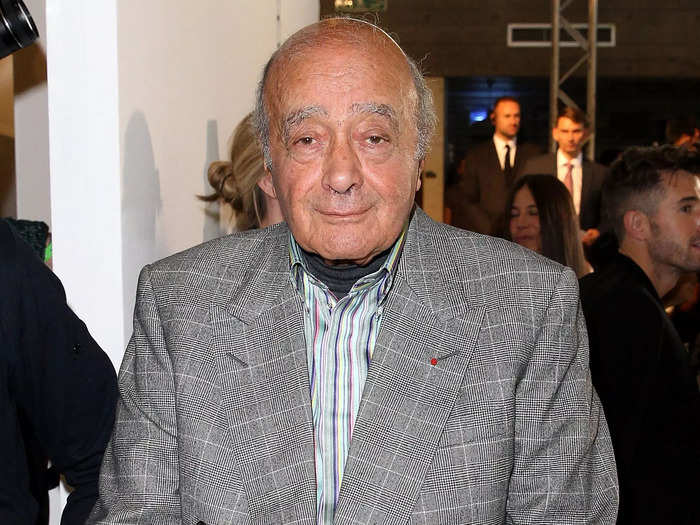
Forbes lists Mohamed's real-time net worth as $1.9 billion dollars as of November 14.
Examples of the family's wealth, including expensive watches and private planes, are depicted in "The Crown."
The source of the family's wealth has been called into question by the British Department of Trade and Industry, who accused them of misrepresenting information about "their origins, their wealth, their business interests, and their resources" when taking over Harrods, according to the New York Times.
Mohamed was born in Egypt when it was still part of the British Empire, which made a strong impression on him as a child.
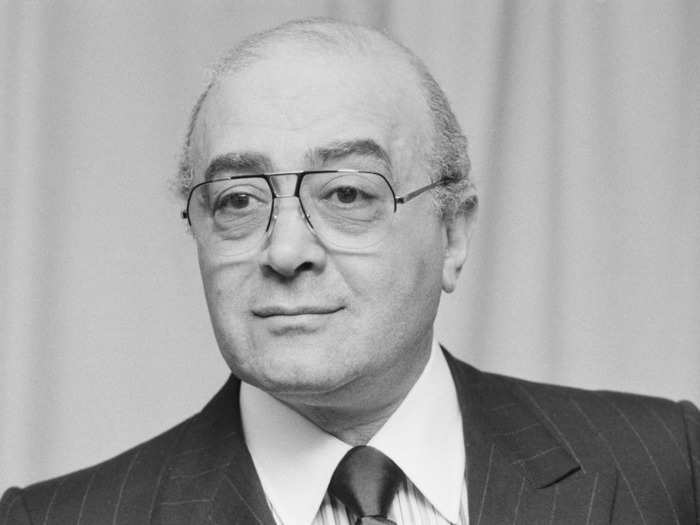
British forces first occupied Eygpt in 1882, according to the United Kingdom's national archives. They remained until the 1950s when the Suez canal crisis, shown in season two of "The Crown," led their troops to withdraw their military presence.
Mohamed, who financed the family's most notable acquisitions, was born in British-occupied Eygpt sometime in the late 1920s or early 1930s.
Mohamed has been quoted by Town and Country as saying he was born in 1933, which is listed as his birth year in the National Portrait Gallery. But a report from the British Department of Trade and Industry published in 1990 contradicted that and listed his birth year as 1929.
"The Crown" shows Mohamed growing up shortly after King George VI abdicated the British throne to court and married his American sweetheart Wallis Simpson. He worships the British as "Gods" in the dramatized series.
In real life, he boasted to the New York Times in 1985 about having an English nanny and an education fashioned after British standards.
"The impression of a great empire and a King dropping everything because of his love for a woman — this is what I lived with as a child," Mohamed told People in 1990.
In his 20s, Mohamed worked for the prominent Saudi businessman Adnan Khashoggi, and he married Adnan's sister Samira Khashoggi in 1954.
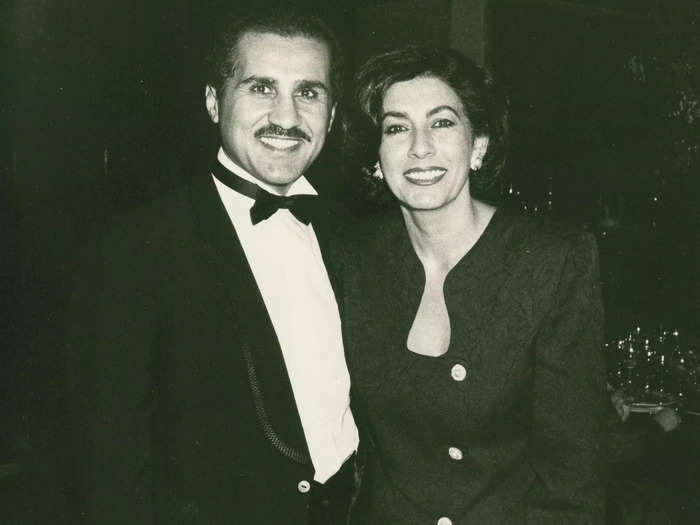
According to a 1997 Vanity Fair article by royal biographer Sally Bedell Smith, Adnan Khashoggi, a Saudi businessman from a prominent family, employed Mohamed in his import-export business in the 1950s.
Adnan's father served as the "private physician to the king of Saudi Arabia," Vanity Fair reports.
Mohamed married Adnan's sister Samira in 1954, according to Britannica, and the couple divorced a few years later after the birth of their son.
Samira remarried an ambassador named Anas Yassin and penned several books before dying in the late 1980s.
Mohamed and Samira had their son Dodi in 1955, shortly before divorcing.
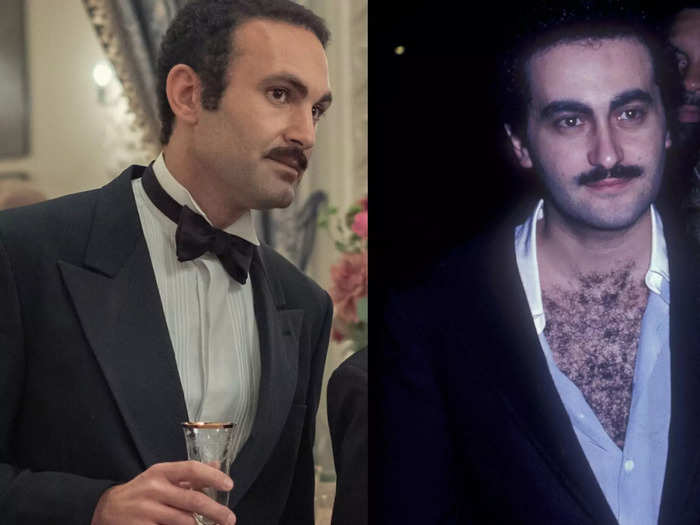
Emad El-Din Mohamed Abdel Mena'em Fayed, also known as "Dodi," was born in 1955. He became a successful film producer with his father's financial resources.
Mohamed moved to the United Kingdom in the mid-1970s and added the prefix "Al" to his surname.
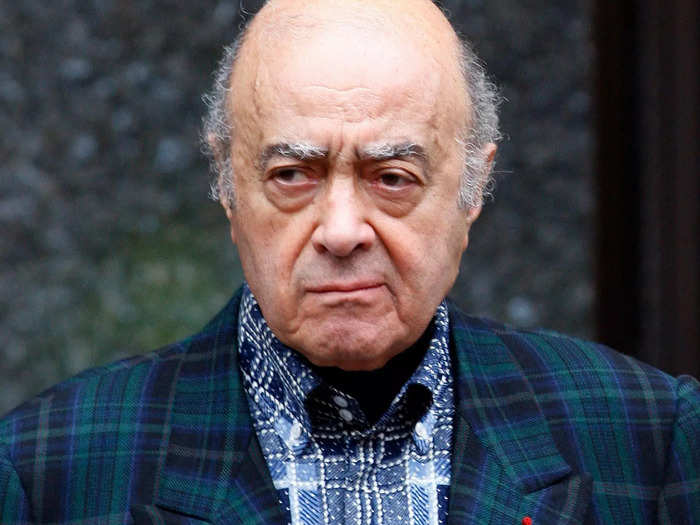
According to a September 1995 article by Maureen Orth in Vanity Fair, Mohamed added the "Al" prefix to his surname shortly before migrating to Britain in the 1970s.
He reportedly vowed never to set foot in Eygpt again in an interview with the New York Times.
As shown in "The Crown," the Al-Fayed family purchased The Ritz Paris in 1979 and renovated it.
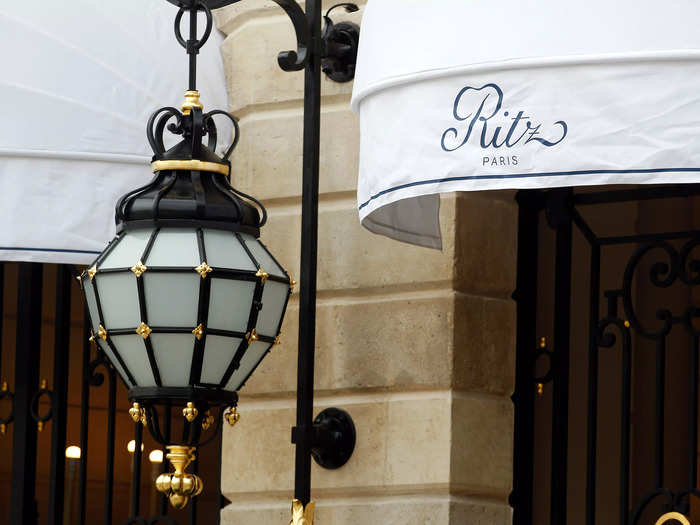
In season five, episode three of "The Crown," Mohamed and Dodi attend a meeting with representatives of The Ritz hotel in Paris, who are concerned about whether or not the funds behind their bid for the hotel are guaranteed.
According to Time, he bought the hotel in real life in 1979 and subsequently completed a massive renovation to the historic property.
In 1981, Mohamed funded the film "Chariots of Fire." The film's director thanked Mohamed and Dodi, who produced the film, on the Oscars stage in 1982.

Dodi and his father produced the Academy Award-winning movie "Chariots of Fire" in 1981.
In "The Crown," viewers see real footage from David Puttnam's acceptance speech for the Academy Award for Best Picture at the 54th Annual Academy Awards in 1982.
He lists "Mohamed and Dodi Fayed" among the film's champions and thanks them for putting "their money where my mouth was."
Mohamed acquired Harrods, a famed department store significant to British culture, in 1984.
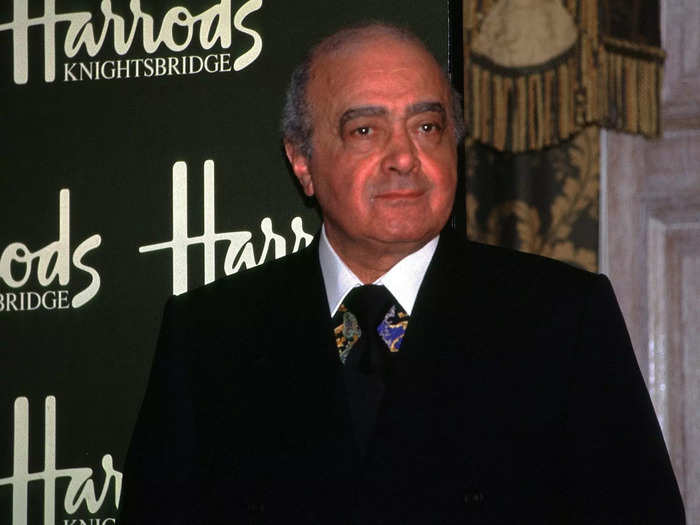
The famed department store was bought by the Al-Fayed family in 1984 according to The Independent. As Mohamed told the New York Times in 1985, "There is only one Harrods."
Vice reported in 2020 that Harrods is a staple of British culture so entrenched that it has been name-dropped in several songs.
Despite owning this landmark, CBS reported in 1998 that he was denied British citizenship because of discrepancies about the source of the funds he used to purchase the store.
The AP reported in 1990 that Mohamed and his brothers Ali and Salah lied about their family history to make the acquisition. The brothers denied these allegations.
The brothers worked together frequently, according to the New York Times, though Mohamed was the one "The Crown" showed doing the bulk of the business deals.
"In general, if you speak to any one of the brothers, you have spoken to all of them,'' Peter Costain, a director of the construction company Costain Group, told the New York Times in 1985.
The family reportedly sold the department store to the Qatari royal family in 2010, according to The Guardian.
In 1985, Mohamed married Finnish socialite-turned-model Heini Wathén. The couple have four children together.
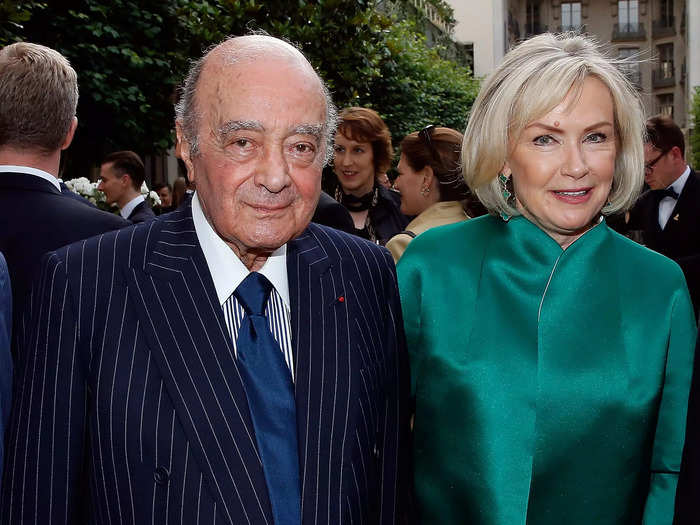
The couple have four children together: Jasmine, Karim, Camilla and Omar.
Jasmine is a designer who studied at the Central Saint Martins and London College of Fashion. Karim is a producer, according to IMDB. Camilla is the restauranteur behind Farmacy, according to GQ.
Tatler described Omar as "a tech and space entrepreneur," while Town & Country reported Omar is "focusing on a variety of entrepreneurial endeavors, that all center around environmentalism."
The impression the Duke and Duchess of Windsor made on a young Mohamed led him to spend $14.4 million to renovate one of their former Parisian residences in 1986.
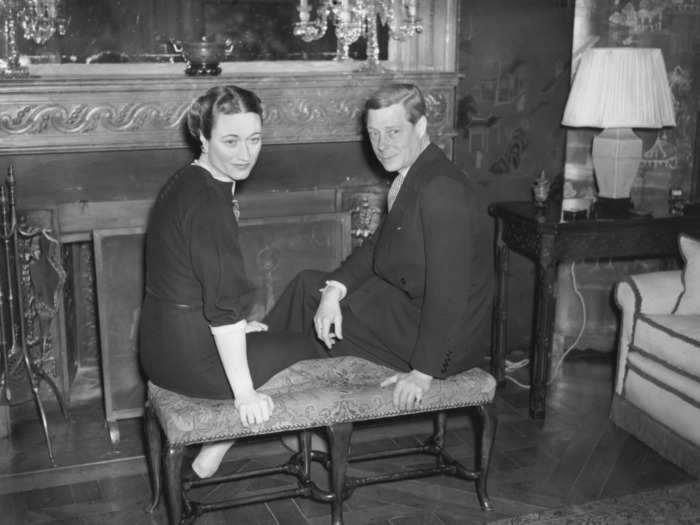
Mohamed spent $14.4 million to bring "Villa Windsor" back to its former glory when the residence fell into disrepair, according to Architectural Digest.
He converted the first two floors of the property into a museum that would accommodate "historians, members of the British royal family, personalities, friends, and important guests of the Ritz," AD reported.
In 1997, Mohamed purchased the Fulham Football Club, a club in England's Premier League based in southwest London, and actively supported the team.
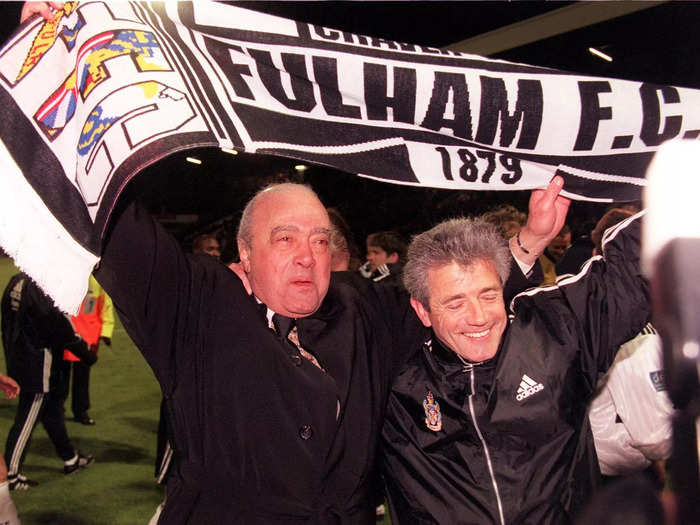
CNN reported that he showed up to matches after purchasing the team in 1997 for roughly $9 million, and he poured an additional $300 million into the club.
He sold the team to Shahid Khan, owner of the Jacksonville Jaguars, in 2013 ,according to CNN.
Despite his attempts to reach the highest echelons of British society, Mohamed reportedly felt snubbed by the British upper crust.
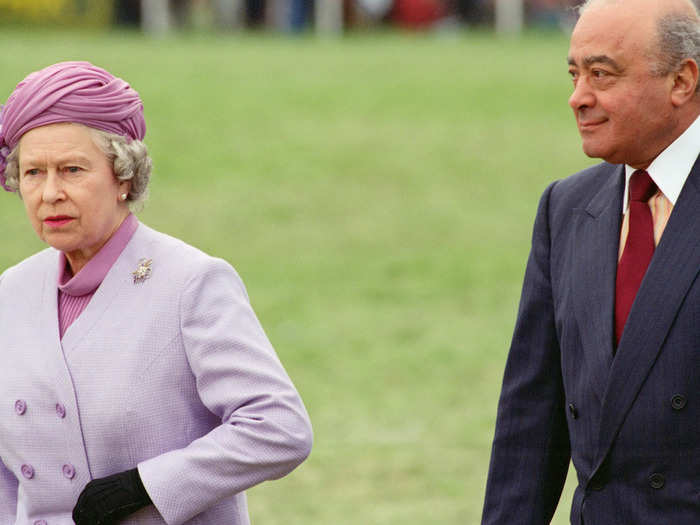
Mohamed was an influential but controversial figure in Britain in the '90s and '00s, according to Town & Country.
Many of the spaces he sought for his family, like seats at royal events, were occupied by people who had been courtiers for generations, and his family's sudden arrival on the scene in the 1970s reportedly prevented them from gaining that level of access.
Mohamed has cited British racism and snobbery as the reason he has not been allowed to become a British citizen, despite several attempts.
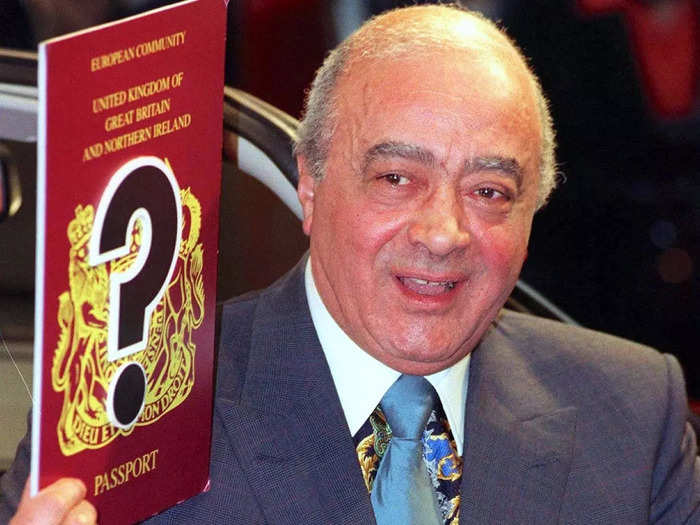
Mohamed applied to be a British citizen several times, first in 1995. And when his applications were fruitless, he exposed politicians who had taken favors from him to the media.
"I did it to take my revenge, to show people who really runs this country, what quality they are," he told Vanity Fair in 1995.
"These days, it's only the trash people," he said of Conservative British politicians at the time.
He blamed racism for the rejections in the same interview. "I can still hear the prejudice, the racists at the core of the upper class," he told Vanity Fair. "They call themselves the so-called establishment," he said.
"I only wish to share the nationality of my four British children," he said in a letter to the New York Times in 1996.
But Princess Diana befriended Mohamed and eventually formed relationships with other family members.
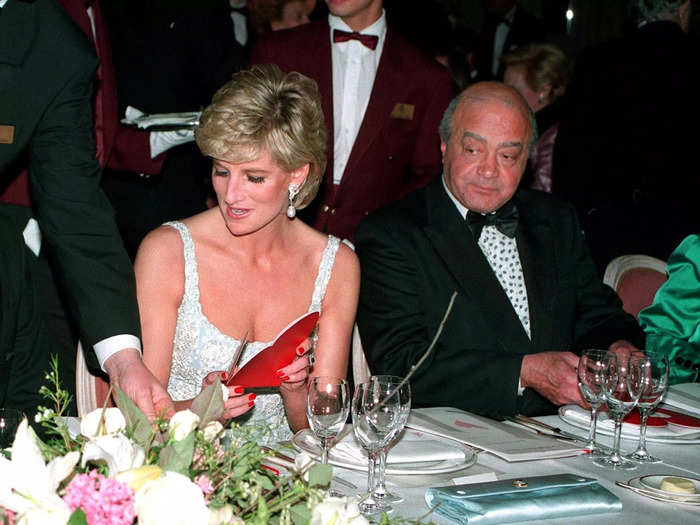
In "The Crown," Mohamed's character befriends Princess Diana at the Harrods'-sponsored Royal Windsor Horse Show. After he is snubbed by the Queen (Imelda Staunton), Diana sits with Mohamed, and he asks her to call him "Mou Mou."
"The Crown" depicts the pair sharing a sense of humor and compassionate nature.
Mohamed and Diana were often spotted enjoying one another's company. She was reportedly unbothered by the vagueness surrounding his family's background.
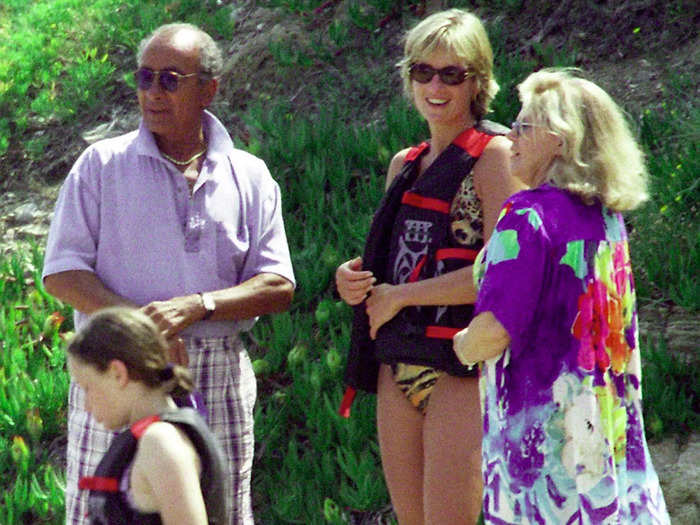
Diana was Mohamed's guest aboard his yacht in 1997 and brought Prince William and Prince Harry along for the vacation in Saint-Tropez, according to Town & Country.
Vanity Fair reported in 1997 that Mohamed was a friend of the late Earl Spencer, Diana's father. Diana also reportedly said that Mohamed's wife Heini was "one of her oldest friends."
"Diana is so easygoing with Mohamed. . . . Mohamed is not one of those who are overwhelmed by her. They spark off each other very well," Michael Cole, then a director of public relations at Harrods, told Vanity Fair about their friendship in 1995.
Mohamed's son Dodi dated Princess Diana in 1997 for a few months.
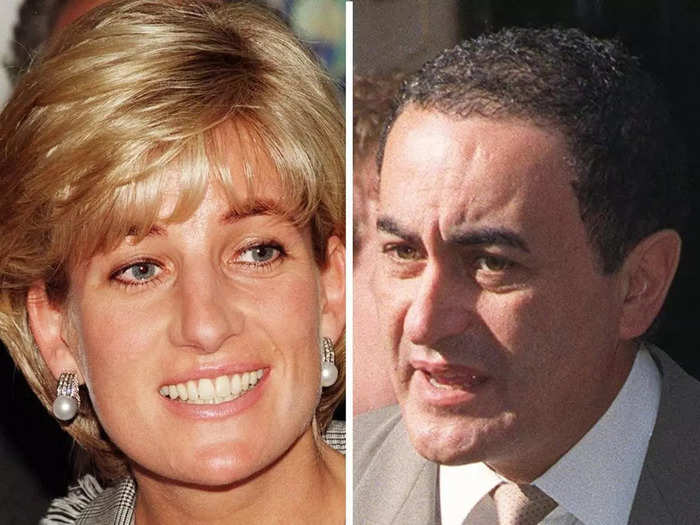
According to the Washington Post, Diana and Dodi reportedly began their romance aboard Mohamed's yacht in 1997, and the two were soon discussing engagement.
"They shared an attitude toward the Establishment and the royal family, a distaste for what Diana would call the firm,' the people who surround the royals," Max Clifford, a friend and political ally of Mohamed, told the Washington Post in 1997.
Dodi was in the car with Princess Diana during the fatal crash inside a tunnel in Paris in 1997.
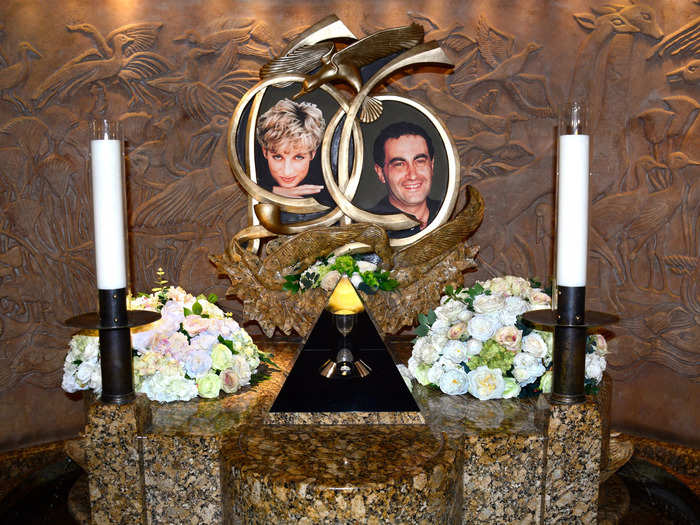
Dodi was pronounced dead at the scene, according to the New York Times, and Diana died a few hours later from injuries she sustained in the crash, the New York Times reported in 1997.
The two were leaving the Ritz Paris after dining there that evening, the AP reported.
Mohamed has said that Dodi and Diana's deaths were the result of racism and murder.
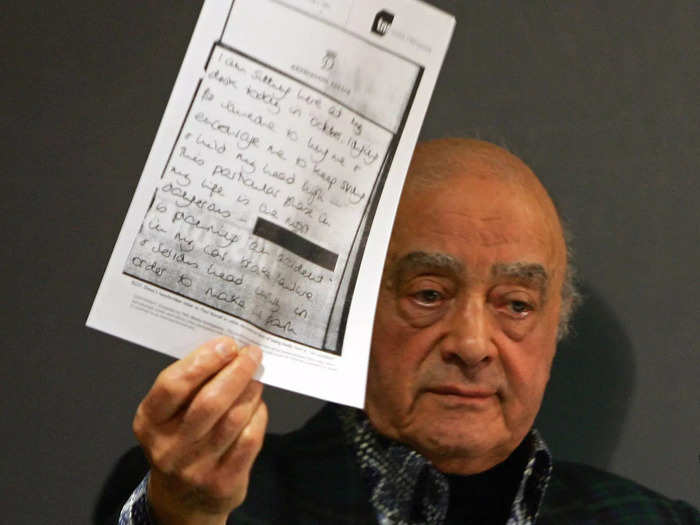
The crash led to several conspiracy theories, some of which included that the couple were murdered.
Mohamed submitted a videotaped statement requesting American intervention in the resulting investigations in 2001, ABC News reported.
"I seek the support of the American people to bring pressure through the members of Congress to release the documents that will reveal the truth about the tragedy. I am in no doubt that the death was the result of a murder with racism at the core," he said in the tape according to ABC News.
When the official findings were published by French authorities, he hired his own investigators and publicly appealed the reports, according to Vanity Fair.
"I will never be able to reconcile myself to the needless and cruel deaths of two people who were so vibrant, generous, and full of life," Mohamed said in a prepared statement published by the Washington Post in 1997. "God took their souls to live together in paradise. Now they have peace."
Popular Right Now
Popular Keywords
Advertisement